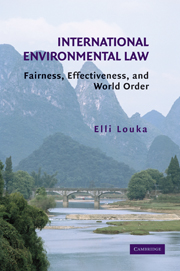Book contents
- Frontmatter
- Contents
- Foreword by W. Michael Reisman
- Abbreviations
- Introduction
- Chapter 1 Introduction to International Environmental Law
- Chapter 2 Foundations of International Environmental Law
- Chapter 3 Compliance and Governance Mechanisms
- Chapter 4 Marine Environment
- Chapter 5 Water Resources
- Chapter 6 Fisheries Resources
- Chapter 7 Biodiversity
- Chapter 8 Air Pollution
- Chapter 9 Trade and Environment
- Chapter 10 Hazardous and Radioactive Wastes
- Chapter 11 Liability and State Responsibility
- International Treaties and Other Instruments
- List of Cases
- Index
Chapter 1 - Introduction to International Environmental Law
Published online by Cambridge University Press: 14 January 2010
- Frontmatter
- Contents
- Foreword by W. Michael Reisman
- Abbreviations
- Introduction
- Chapter 1 Introduction to International Environmental Law
- Chapter 2 Foundations of International Environmental Law
- Chapter 3 Compliance and Governance Mechanisms
- Chapter 4 Marine Environment
- Chapter 5 Water Resources
- Chapter 6 Fisheries Resources
- Chapter 7 Biodiversity
- Chapter 8 Air Pollution
- Chapter 9 Trade and Environment
- Chapter 10 Hazardous and Radioactive Wastes
- Chapter 11 Liability and State Responsibility
- International Treaties and Other Instruments
- List of Cases
- Index
Summary
THE WORLD COMMUNITY AND INTERNATIONAL LAW
International Law
Modern international law has emerged from the ruins of two world wars. Before World War I, public international law regulated the conduct of war. During that period, states had the freedom to choose between war and peace. States had the right to pursue their goals by war. The distinction between just wars and unjust wars was not legally pertinent.
The reorientation of international law came with the establishment of the League of Nations following World War I. The League condemned external aggression against the territorial integrity and political independence of League members. Another important development during this period was the establishment of the Permanent Court of International Justice (PCIJ) and the International Labor Organization (ILO). However, these developments did not prevent the eruption of World War II.
In the aftermath of World War II, one of the most important developments was the establishment of the United Nations. The United Nations Charter outlawed war as a general means for the resolution of disputes among states. After two world wars, states realized that some institutional framework must be established and some rules promulgated that would provide procedural and substantive safeguards to avert future wars. The United Nations was to serve primarily that purpose: preservation of peace among states.
International law is the law that states make to regulate matters among them: first and foremost, war and peace and, after the attainment of a minimum peace order, other matters including economic development, exchange rates, trade, the environment, and intellectual property rights.
- Type
- Chapter
- Information
- International Environmental LawFairness, Effectiveness, and World Order, pp. 5 - 58Publisher: Cambridge University PressPrint publication year: 2006



